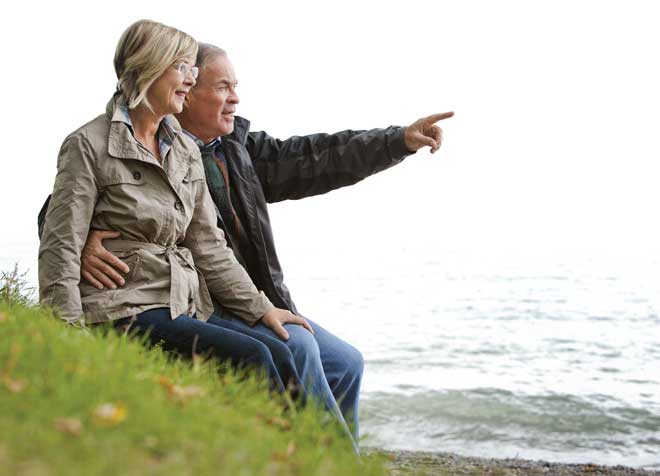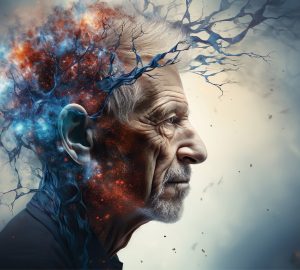You hope it doesn’t happen to you. Or to anyone you know. But, of course, the statistics make that unlikely. More than 5 million Americans are living with the loss of mental function caused by Alzheimer’s disease. Another American receives the diagnosis every 67 seconds, according to the Alzheimer’s Association.
hope & disappointment
“It has been a very discouraging 15 years or so,” says Dr. John C. Morris, professor of neurology at Washington University School of Medicine and director of the Charles F. and Joanne Knight Alzheimer’s Disease Research Center.
“Around 2000, we thought we were on the threshold of new therapies that would address the underlying mechanisms that cause Alzheimer’s disease,” he says. “We had high hopes these therapies would arrest the progress of the disease.”
Alzheimer’s disease, first described in 1901 by German psychiatrist Alois Alzheimer, accounts for 50 to 80 percent of dementias. It is a progressive disease that develops slowly, eventually interfering with speech and interactions with surroundings. It is the sixth leading cause of death in the U.S., according to the Alzheimer’s Association.
what we do know
Years ago researchers identified two abnormal structures that develop and kill nerve cells in the brains of people with Alzheimer’s. “The goal of all the research is to affect the plaques and tangles that are the hallmark of Alzheimer’s disease,” says Dr. Maurice Redden, assistant professor of geriatric psychiatry at Saint Louis University School of Medicine. “Unfortunately there is no treatment option. That research is ongoing.”
Better diagnostic techniques are helping researchers study possible therapies, he says. “We are getting more sensitive in diagnosis, with brain scanning and genetic tests of certain blood markers,” Redden notes. “That may allow us to identify people earlier and see what might be leading them to develop Alzheimer’s.”
what went wrong
Recent drug trials may have failed because the drugs targeted the wrong mechanisms or because they simply were not very good, Morris says. “Many believe they were administered too late in the disease process,” he notes. “What we have come to realize is that the stage at which we recognize Alzheimer’s disease is probably the end stage.” Before diagnosis, he says, “there is a silent period lasting 20 years, maybe longer, in which brain changes are occurring but do not yet have clinical manifestations.”
Startling findings were made when patients with early-stage Alzheimer’s died from other causes such as accidents or heart attacks, Morris says. “When we examined their brains, we found that in certain regions that are vulnerable to the Alzheimer’s process, more than 50 percent of brain cells already had been destroyed, but memory and thinking were just beginning to be recognized as deteriorating.”
Besides eating a healthy diet and exercising both body and brain, Alzheimer’s patients and caregivers offer a valuable piece of advice, says Redden. “That advice is to enjoy the time you have now. Enjoy each day because your experience can change at any moment.”
 [early onset Alzheimer’s]
[early onset Alzheimer’s]
Who among us has not dropped our car keys mindlessly in a location that cannot and will not be remembered when it is time to rush out of the house? Even in our prime years, aren’t we all over-stressed at times?
how do we know it’s dementia?
Well, if we can’t remember how to use the car keys or get lost on the way to a friend’s house, that may be another matter. Alzheimer’s disease is known as a scourge of the retired, but a small number of people develop the brain disease before reaching the age of 50—about 200,000 Americans, according to the Alzheimer’s Association.
The early-onset disease often is not diagnosed, says Jan McGillick, a geriatric social worker and director for the six Dolan Memory Care Homes in the St. Louis area. “If you are younger, your doctor might not be looking for dementia,” McGillick says. “Some families may not be aware of a member’s behavioral changes or might be in denial for a while.”
in the genes
While scientists do not know why people develop Alzheimer’s, the early-onset form sometimes can be linked to genetics. “We know those who get the disease early have a genetic component that can be traced to family history,” says Dr. Maurice Redden of Saint Louis University.
how will i know?
When does behavior go beyond senior moments? “Normally aging people may take longer to recall things or learn a new task,” McGillick says. “But for someone with dementia, it might be very difficult to learn a new task.” Most older adults learn coping mechanisms and problem-solving techniques to deal with memory issues —hanging the car keys and sunglasses on a hook by the door, for example. After Alzheimer’s symptoms arise, “they may not remember their coping techniques,” McGillick notes.
Initial signs of Alzheimer’s may be subtle, she says. “Someone might seem withdrawn, and family members think it is because they lost a job or pet. The individual may become less spontaneous, more rigid and cautious, and less willing to take risks.”
“We can all become stressed and have too much on our plates. We all forget our keys,” says Darrah Strickland, therapist and gerontologist who is the coordinator of Clare Bridge Program for memory care residents at Solana West County in Ballwin. “Behavior becomes more concerning when it begins to affect activities of daily living: our hygiene routines, bill paying, driving to the grocery store.”
Those beginning to exhibit symptoms might still seem active, she says. “They may be very physically able and seemingly high-functioning. But then in conversation, you see they are searching for words and having a difficult time expressing themselves. The family might see bizarre behaviors, like the milk put away in the pantry,” explains Strickland.
“It is different for each person because the brain cell loss doesn’t follow the same trajectory. Depending on what part of the brain is affected, symptoms will be different,” McGillick says.
early onset support
A diagnosis of Alzheimer’s can bring important care to a patient, McGillick says. “Exercise, support groups and some medications can be very helpful. We can’t reverse the disease, but we can minimize the consequences for a very long time.”
Residents of group homes can benefit from stimulating activities, she adds. “They are in a social environment and interacting with other people through music therapy, parties and taking walks.”
Strickland often is asked by friends and relatives if their momentary lapses are signs of Alzheimer’s disease. “I say you don’t have to worry if you sometimes can’t remember where your keys are. It’s when you can’t remember what they are for when it becomes concerning. We need to keep ourselves active and do what we can for ourselves—but a lot of it is out of our hands.”
[alzheimer’s drugs]
There are no medications that can prevent or cure Alzheimer’s disease, but several can slow its progression.
what we can do
“Studies have shown that these drugs don’t necessarily improve performance in cognition or function, but they help maintain it over a period of time,” says Dr. David B. Carr, professor of geriatric medicine at Washington University School of Medicine. “We are just trying to hold things in check, if we can.”
Adds Dr. Scott Vouri, assistant professor of pharmacy practice at St. Louis College of Pharmacy: “There is no way to determine who will respond to medications and who will not at this time.”
how the drugs work
Two classes of medications are prescribed for Alzheimer’s disease. One, acetylcholinesterase inhibitors (AChEI), is used to delay nursing home admission. “These medications, in some patients, may also improve behavior issues associated with Alzheimer’s disease dementia,” Vouri says. The side effects of AChEI drugs include dyspepsia (stomach upset), nausea, vomiting, diarrhea, runny nose and eyes, increased urination and vivid dreams. The other class of medication is the NMDA antagonist Namenda, N-methyl-D-aspartate. “Namenda can be used in patients by itself or in combination with an AChEI, Vouri notes. “There appears to be fewer side effects, which can include headache and cough.”
“Namenda tends to protect the brain cells from injury,” Carr adds. “It has been shown to be more effective in patients with moderate to severe disease. We don’t always prescribe it first, but if people progress to the more moderate stages, we will add Namenda for some cognitive stability.” The prescription medications usually are covered by health insurance plans, Carr says.
food for thought
Another approach involves food supplements intended to increase the energy available to brain cells. “Axona is not well-known and possibly not well-prescribed,” Carr says. “It is a resin that is mixed in water to make a shake and has been shown in mild stages of disease, in a small group, to provide some cognitive stability.”
Axona has been controversial. Last December, the U.S. Food and Drug Administration warned its manufacturer that it was improperly marketing the product as a medical food for “management of the metabolic processes associated with mild to moderate Alzheimer’s disease.”
Carr says Axona attempts to deal with a presumed mechanism of Alzheimer’s disease. “Brain cells love blood sugar, but one of the hypotheses is that the brain is having difficulty getting its No. 1 fuel source into the cells. The other fuel that brain cells will gobble up for energy is fat by-products, or ketones. Axona is metabolized in the liver to ketone bodies that cross the blood-brain barrier.”
Axona has been tested in a small number of patients, Carr says. To be offered as a drug, “normally you’ve got to study several thousand people. I have used it for my patients who haven’t responded to standard therapy. Sometimes we found it to help. Other times we haven’t and discontinued it.”
keep the faith
“We have not had a new Alzheimer’s medicine released for almost a decade,” Carr says. “The medicines we have right now are modest, at best, but it is not for lack of trying.”
He encourages patients to consider participation in research trials being conducted at both St. Louis medical schools as well in private labs. “The real way we are going to combat this disease is to advance the science.”








